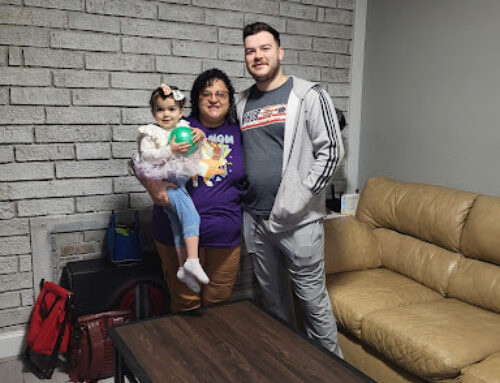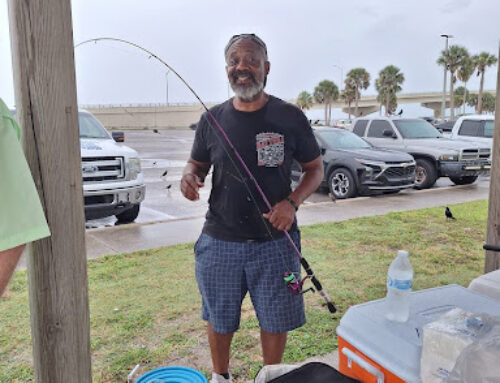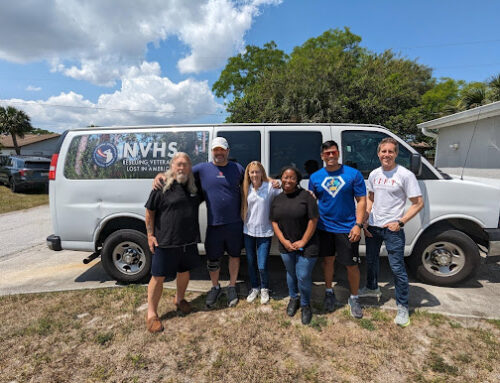Reintegration after military service is more than just a homecoming; it’s a deeply personal, often complex psychological transition. For many veterans, returning to civilian life means adjusting not only to a new routine but to an entirely different identity. From family dynamics to job hunting, from managing mental health symptoms to finding community, the long-term effects of military service can make the reintegration process emotionally and psychologically demanding.
At National Veterans Homeless Support (NVHS), we’ve seen firsthand how these challenges can shape a veteran’s future. That’s why it’s essential to understand what reintegration looks like and how the long-term impact of service can affect every aspect of a veteran’s life.
If you or someone you love is a veteran struggling with the challenges of reintegration in Brevard County, know that help is available.

The Psychological Effects of Military Service
The mental and emotional toll of military service doesn’t always end with a discharge. Many veterans carry invisible wounds, long after combat, deployments, or high-pressure roles have ended.
Heightened Risk for Mental Health Disorders
Veterans are at elevated risk for several mental health conditions, including:
- Post-Traumatic Stress Disorder (PTSD)
- Generalized Anxiety Disorder (GAD)
- Major Depressive Disorder (MDD)
Exposure to trauma, high-stress operations, moral injury, and extended separation from family contribute to these outcomes. These conditions don’t just impact mental well-being; they can affect sleep, relationships, job stability, and physical health.
Impact on Family Relationships
The emotional strain of military service can lead to challenges in parenting, communication, and intimacy. Veterans may return home feeling disconnected or irritable, while family members may struggle to relate to the person their loved one has become.
Long-Term Health Consequences
Chronic stress and untreated mental health issues can lead to significant physical health complications. Veterans face higher risks of cardiovascular disease, substance use disorders, and even autoimmune issues, underscoring the need for integrated mental and physical care.
Difficulties in Reintegration
Transitioning from active duty to civilian life is rarely simple. The structure, purpose, and camaraderie of military service can feel worlds away from everyday civilian routines.
Cultural Disconnection
Many veterans report feeling like outsiders. Civilian conversations, workplace behaviors, and social norms may seem unfamiliar or even meaningless after the intense experiences of service.
Identity Crisis
The military often becomes a core part of a service member’s identity. Leaving that behind can lead to questions of self-worth, a lost sense of purpose, and a profound feeling of “What now?”
Employment Barriers
In June 2025, the veteran unemployment rate stood at 3.7%. While lower than the 4.0% rate for non-veterans, the numbers don’t tell the full story. Veterans with disabilities still face a 5.9% unemployment rate. Translating military experience into civilian resumes, overcoming mental health stigma, and navigating job searches without a support system can be exhausting.
Negative Long-Term Effects of Service
Substance Use
Some veterans turn to alcohol or drugs to cope with symptoms of trauma, anxiety, or depression. What begins as occasional use can develop into substance use disorders that worsen isolation and complicate recovery.
Social Withdrawal
Mental health stigma and the culture of self-reliance in the military can cause many veterans to withdraw socially. This isolation fuels depression and makes it harder to ask for help or build new relationships.
Increased Risk of Suicide
Tragically, suicide remains a serious issue within the veteran community. According to the U.S. Department of Veterans Affairs, approximately 17 veterans die by suicide each day. The risks are higher among those experiencing unemployment, PTSD, or homelessness.
Support That Works: Real Resources for Reintegration Challenges
Accessible Mental Health Services
- Veterans Crisis Line: For immediate support, veterans can dial 988, then press 1 to connect with a trained responder. This service is free, confidential, and available 24 hours a day, 7 days a week.
- VA Mental Health Care: Eligible veterans can access care through local VA clinics and hospitals, which offer treatment for PTSD, depression, anxiety, and substance use.
- PTSD Coach App: Developed by the VA’s National Center for PTSD, this free app offers education, self-assessment tools, symptom tracking, and strategies to manage stress.
- Vet Centers: Community-based locations across the U.S. provide confidential counseling to combat veterans and their families. Services include individual, group, marriage, and family therapy.
Peer and Community-Based Support
- Peer Support: Through programs like our Search & Rescue, veterans are connected with team members who understand their challenges and help build trust and consistency through regular outreach.
-

Buddy Check Programs: Run by groups like The American Legion, these initiatives encourage veterans to check in on one another and build strong peer connections.
Therapeutic and Alternative Healing Opportunities
- Art Therapy at NVHS: We offer art therapy workshops that provide creative ways for veterans to process trauma and express their emotions.
- Service Dogs for Veterans: Nonprofits such as K9s for Warriors and Patriot PAWS provide trained service animals that assist with PTSD and mobility challenges.
- Veterans Yoga Project: Offers free in-person and online classes focused on mindful movement and breathwork, designed specifically for veterans coping with stress and trauma. Visit www.veteransyogaproject.org to join a class.
Education, Advocacy, and Cultural Connection
- Mission 22 & Wounded Warrior Project: These organizations run public campaigns and community education efforts to break down stigma and advocate for better veteran mental health support.
- NVHS Events: From speaking engagements to community rallies, NVHS helps educate civilians about the challenges veterans face, building bridges between military and non-military populations.
NVHS: Meeting Veterans Where They Are
At National Veterans Homeless Support, we know that successful reintegration often starts with stability. Our team works to prevent and eliminate veteran homelessness across Central Florida by addressing the real challenges that lead veterans to crisis in the first place
Our core programs include:
- Search & Rescue: We meet veterans in the woods, in encampments, and on the streets to provide survival supplies, build trust, and begin the process of reintegration.
- Transitional Housing: We assist veterans in transitioning to safe, affordable housing and provide the necessary resources to maintain long-term stability.
- PTSA: This initiative fosters a community for those experiencing PTSD by offering education, awareness, and emotional support. Veterans no longer have to face their struggles alone.

Stability in Motion: How NVHS Helped the Burrells Regain Independence
After an eviction left them homeless, the Burrell family turned to NVHS. D. Burrell, his wife, and their young daughter, recently diagnosed with cancer, entered our transitional housing program to get back on their feet.
With only one car, balancing full-time work and frequent medical appointments was nearly impossible. This week, NVHS helped ease that burden by providing the family with a van, allowing them to move forward with greater stability and hope.
Your support helps make moments like this possible.
How You Can Help Veterans Reintegrate with Dignity
If you believe in giving back to those who’ve served, we invite you to join us.
- Donate today to support outreach, therapy, housing, and life-changing reintegration services.
- Volunteer with us to connect directly with veterans in your community.
- Discover more about our programs and explore the various ways you can make a meaningful impact.
Together, we can ensure no veteran is left behind after service.





